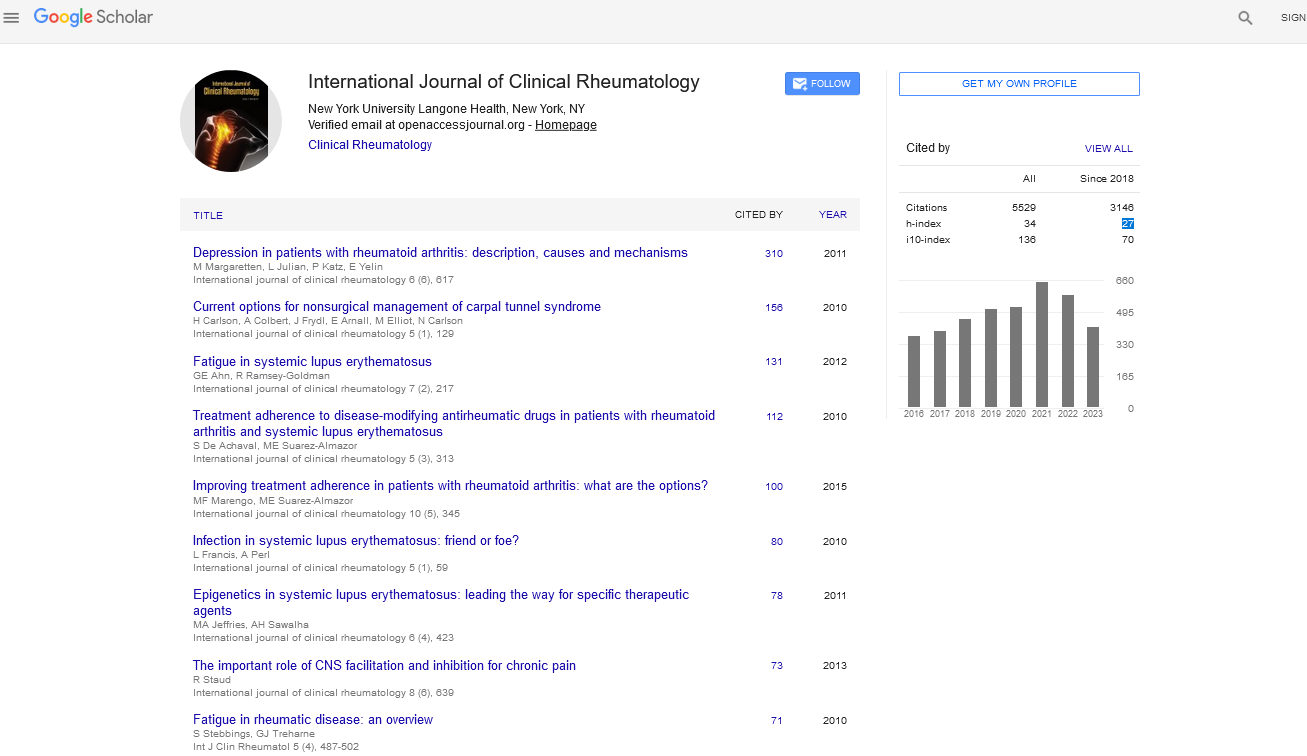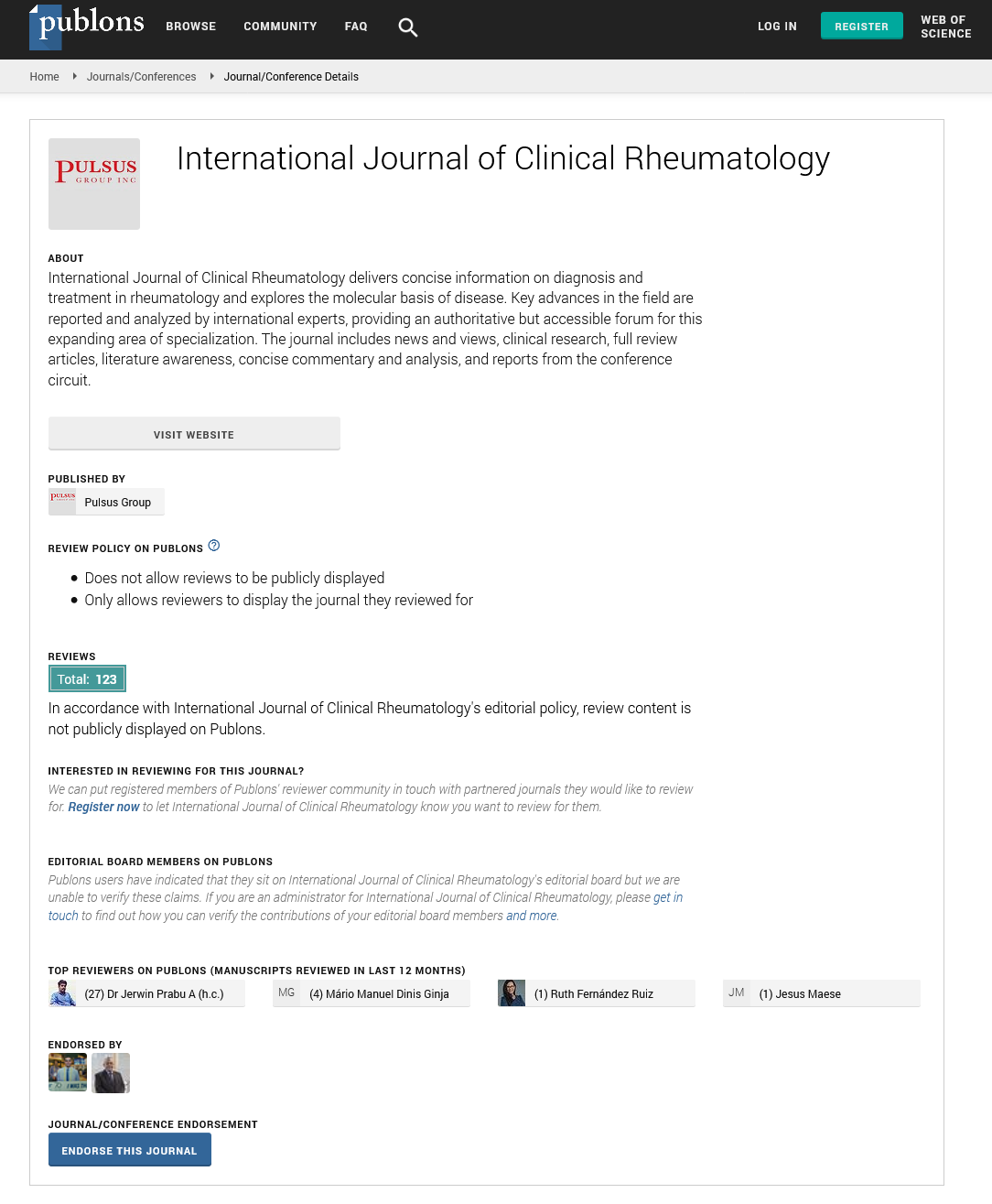Mini Review - International Journal of Clinical Rheumatology (2024) Volume 19, Issue 2
Finding Synergy in Recovery: Embracing Multidisciplinary Approaches in Rheumatology
Abini Adebayo*
Department of Medicine, Bayero University, Kano, Nigeria
- *Corresponding Author:
- Abini Adebayo
Department of Medicine, Bayero University, Kano, Nigeria
E-mail: abini99@yahoo.com
Received: 01-Feb-2024, Manuscript No. fmijcr-24-133556; Editor assigned: 03- Feb-2024, Pre-QC No. fmijcr-24-133556 (PQ); Reviewed: 16-Feb-2024, QC No. fmijcr-24-133556; Revised: 22- Feb-2024, Manuscript No. fmijcr-24-133556 (R); Published: 28-Feb-2024, DOI: 10.37532/1758- 4272.2024.19(2).68-70
Abstract
Rheumatology, the branch of medicine focused on the diagnosis and treatment of musculoskeletal and autoimmune diseases, encompasses a diverse array of conditions that can profoundly impact patients' lives. In recent years, there has been a growing recognition of the importance of interdisciplinary care in managing these complex diseases. By fostering collaboration among healthcare professionals from various disciplines, interdisciplinary care seeks to optimize patient outcomes, enhance quality of life, and promote holistic well-being. In this article, we explore the concept of harmony in healing through the lens of interdisciplinary care in rheumatology.
Keywords
Rheumatology • Autoimmune diseases • Psychological support
Introduction
Interdisciplinary care in rheumatology involves a team-based approach that brings together rheumatologists, nurses, physical therapists, occupational therapists, psychologists, social workers, and other healthcare professionals to address the diverse needs of patients with rheumatic diseases. Each member of the interdisciplinary team contributes unique expertise and perspectives to provide comprehensive, patient-centered care [1, 2].
Methodology
One of the primary benefits of interdisciplinary care in rheumatology is its ability to enhance the accuracy of diagnosis and optimize treatment outcomes. Rheumatic diseases often present with complex symptoms and overlapping manifestations, making accurate diagnosis challenging. By collaborating with colleagues from different specialties, rheumatologists can leverage complementary skills and resources to conduct thorough evaluations, interpret diagnostic tests, and formulate individualized treatment plans tailored to each patient's needs.
For example, physical therapists play a vital role in assessing joint mobility, muscle strength, and functional limitations, while occupational therapists focus on activities of daily living and ergonomic adaptations. Psychologists and social workers provide valuable support in addressing the psychological and social aspects of living with chronic illness, including coping strategies, stress management, and social support networks [3-5].
Improving disease management and quality of life
Interdisciplinary care extends beyond diagnosis and treatment to encompass ongoing disease management and support throughout the patient's journey. By collaborating closely with other healthcare professionals, rheumatologists can ensure continuity of care, monitor disease progression, and address emerging needs as they arise. Physical therapists develop tailored exercise programs to improve joint flexibility, muscle strength, and cardiovascular fitness, helping patients manage symptoms and maintain functional independence. Occupational therapists offer practical solutions for overcoming barriers to daily activities, such as assistive devices, ergonomic modifications, and energy conservation techniques. Psychological support and counseling are integral components of interdisciplinary care, particularly for patients coping with the emotional challenges of living with chronic illness. Psychologists help patients develop coping strategies, address anxiety and depression, and cultivate resilience and self-efficacy in managing their condition.
Fostering patient empowerment and engagement
Interdisciplinary care empowers patients to take an active role in managing their health and well-being by providing them with the knowledge, skills, and resources they need to make informed decisions and navigate the complexities of their condition. By involving patients as partners in their care, interdisciplinary teams foster a sense of ownership and accountability, leading to greater engagement and satisfaction with treatment. Patient education is a cornerstone of interdisciplinary care, with healthcare professionals providing information on disease mechanisms, treatment options, selfmanagement strategies, and lifestyle modifications.
Shared decision-making ensures that treatment plans align with patients' preferences, values, and goals, fostering a collaborative relationship between patients and their healthcare providers [6-8].
Promoting research and innovation
Interdisciplinary care in rheumatology also drives innovation and advances in research by fostering collaboration among researchers, clinicians, and other stakeholders. By sharing knowledge, expertise, and resources, interdisciplinary teams can tackle complex research questions, explore novel treatment approaches, and translate scientific discoveries into clinical practice.
Furthermore, interdisciplinary care facilitates the integration of emerging technologies and digital health solutions into patient care, such as telemedicine, wearable devices, and mobile applications. These innovations enhance access to care, monitor disease activity remotely, and empower patients to actively participate in their health management. Harmony in healing is achieved through the collaborative efforts of interdisciplinary teams dedicated to providing comprehensive, patient-centered care in rheumatology. By embracing the principles of interdisciplinary care, healthcare professionals can optimize diagnosis, treatment, and disease management, enhance quality of life, and promote holistic well-being for patients with rheumatic diseases. As we continue to advance the field of rheumatology, interdisciplinary collaboration will remain essential in addressing the complex needs of patients and improving outcomes across the care continuum [9, 10].
Conclusion
In conclusion, embracing interdisciplinary care in rheumatology embodies the essence of harmony in healing. By bringing together healthcare professionals from diverse backgrounds and specialties, interdisciplinary teams can provide comprehensive, patient-centered care that addresses the complex needs of individuals living with rheumatic diseases. Through collaboration, communication, and shared decisionmaking, interdisciplinary care optimizes diagnosis, treatment, and disease management, ultimately enhancing quality of life and promoting holistic wellbeing for patients. Furthermore, interdisciplinary collaboration drives innovation, fosters research advancements, and facilitates the integration of emerging technologies into clinical practice. As we continue to navigate the complexities of rheumatologic care, embracing the principles of interdisciplinary care will remain essential in achieving optimal outcomes and improving the lives of patients across the continuum of care.
References
- Kamau JM, Mbui DN, Mwaniki JM, Mwaura FB (2018) Utilization of rumen fluid in production of bio- energy from market waste using microbial fuel cells technology. J Appl Biotechnol Bioeng 5: 227‒231.
- Kamau JM, Mbui DN, Mwaniki JM, Mwaura FB (2020) Proximate analysis of fruits and vegetables wastes from Nairobi County, Kenya. J Food Nutr Res 5: 1-8.
- Kinyua A, Mbugua JK, Mbui DN, Kithure J, Michira I, et al. (2022) Voltage Recovery from Pesticides Doped Tomatoes, Cabbages and Loam Soil Inoculated with Rumen Waste: Microbial Fuel Cells. IJSRSET 9: 172-180.
- Kinyua A, Mbugua JK, Mbui DN, Kithure J, Michira I, et al. (2022) Voltage Recovery from Pesticides Doped Tomatoes, Cabbages and Loam Soil Inoculated with Rumen Waste: Microbial Fuel Cells. IJSRSET 9: 172-180.
- Kiyasudeen SK, Ibrahim MK, Ismail SA (2015) Characterization of Fresh Cattle Wastes Using Proximate, Microbial and Spectroscopic Principles. Am Eurasian J Agric Environ Sci 15: 1700-1709.
- Lazor M, Hutnan M, Sedlacek S, Koles N, Spalkova V (2010) Anaerobic codigestion.
- Li Y, Jin Y, Borrion A, Li H, Li J (2017) Effects of organic composition on the anaerobic biodegradability of food waste. Bioresour Technol 243: 836-845.
- Mbugua JK, Mbui DN, Waswa AG, Mwaniki JM (2022) Kinetic Studies and Simulation of Microbial Fuel Cells Voltage from Clostridium Spp. and Proteus. J Microb Biochem Technol 14: 483.
- Mbugua JK, Mbui DN, Mwaniki J, Mwaura F, Sheriff S (2020) Influence of Substrate Proximate Properties on Voltage Production in Microbial Fuel Cells. J Sustain Bioenergy Syst 10: 43-51.
- Neves L, Oliveira R, Alves M (2003) Influence of inoculum activity on the bio-methanization of a kitchen waste under different waste/inoculum ratios. Process Biochem 39: 2019-2024.
Indexed at, Google Scholar, Crossref
Indexed at, Google Scholar, Crossref
Indexed at, Google Scholar, Crossref
Indexed at, Google Scholar, Crossref


